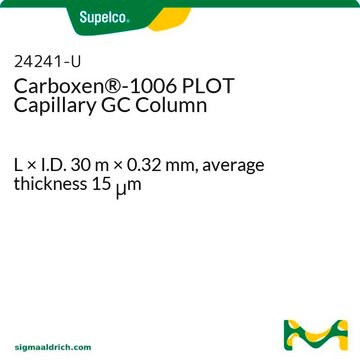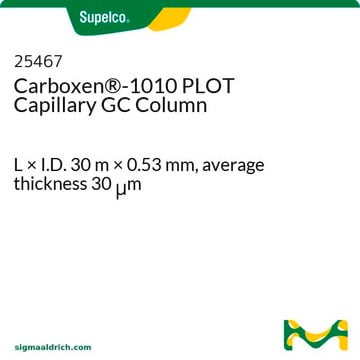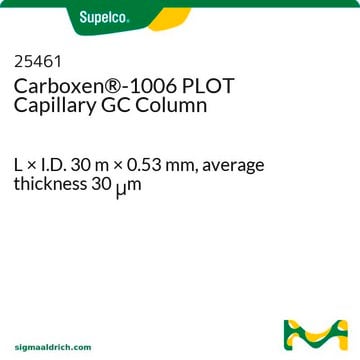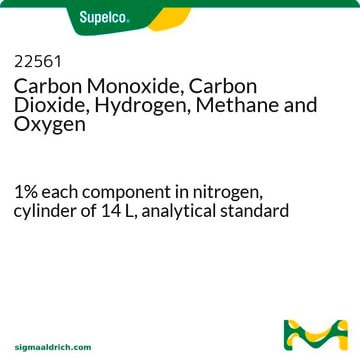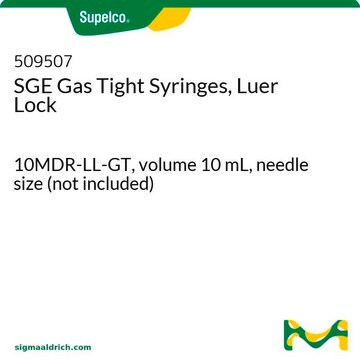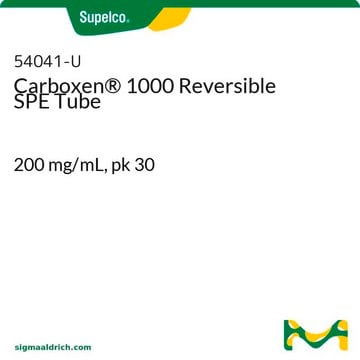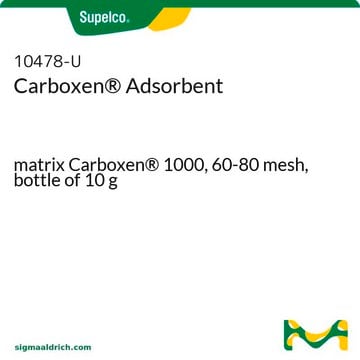24246
Carboxen®-1010 PLOT Capillary GC Column
L × I.D. 30 m × 0.32 mm, average thickness 15 μm
Synonym(s):
Carboxen® 1010 PLOT Column, 30m x 0.32mm
Sign Into View Organizational & Contract Pricing
All Photos(1)
About This Item
EC Number:
UNSPSC Code:
41115710
Recommended Products
material
fused silica
Quality Level
Agency
ASTM® D3612-96
description
PLOT = Porous Layer Open Tubular
manufacturer/tradename
Carboxen®
parameter
≤25-250 °C temperature (isothermal or programmed)
average thickness
15 μm
df
15 μm
technique(s)
gas chromatography (GC): suitable
L × I.D.
30 m × 0.32 mm
matrix active group
Carbon molecular sieve phase
application(s)
chemicals and industrial polymers
food and beverages
column type
capillary PLOT
Looking for similar products? Visit Product Comparison Guide
General description
Porous-layer open-tubular (PLOT) columns are a powerful tool suitable in gas chromatography for analysis of fixed gases, light hydrocarbons and volatile solvents. They are mostly preferred over traditional columns.
Application: This column is ideal for the separation of all major components in permanent gas (helium, hydrogen, oxygen, nitrogen, carbon monoxide, methane, and carbon dioxide) and light hydrocarbons (C2-C3) in the same analysis. It is the only column commercially available that is able to separate all major components in permanent gas. This column can also separate oxygen from nitrogen at subambient temperatures.
USP Code: None
Phase:
USP Code: None
Phase:
- Carbon molecular sieve
- Subambient to 250 °C (isothermal or programmed)
Application
Gas chromatograph (GC), equipped with a 1010 Carboxen® GC Plot capillary column and a thermal conductivity detector (TCD) was also used for the chemical analyses of the composition of product gas in the batch enrichment assays, during bioprospecting thermophilic microorganisms derived from Icelandic hot springs which are efficient producers of hydrogen and ethanol.
Other Notes
We offer a variety of chromatography accessories including analytical syringes
Legal Information
ASTM is a registered trademark of American Society for Testing and Materials
Carboxen is a registered trademark of Merck KGaA, Darmstadt, Germany
Choose from one of the most recent versions:
Already Own This Product?
Find documentation for the products that you have recently purchased in the Document Library.
Customers Also Viewed
Bioprospecting Thermophilic Microorganisms from Icelandic Hot Springs for Hydrogen and Ethanol Production.
Koskinen P
Energy and Fuels, 22 (1), 134-140 (2007)
Porous layer open-tubular capillary columns: preparations, applications and future directions.
Journal of Chromatography A, 842 (1), 115-142 (1999)
Louise Urruty et al.
Journal of agricultural and food chemistry, 50(11), 3129-3136 (2002-05-16)
To provide an efficient and running analytical tool to strawberry plant breeders who have to characterize and compare the aromatic properties of new cultivars to those already known, a HS-SPME/GC-MS analysis method has been coupled with a statistical treatment method
Noushin Rastkari et al.
Journal of chromatography. B, Analytical technologies in the biomedical and life sciences, 877(14-15), 1568-1574 (2009-04-28)
Carbon nanotubes (CNTs) are a kind of new carbon-based nano-materials which have drawn great attention in many application fields. The potential single-walled carbon nanotubes (SWCNTs) as solid-phase microextraction (SPME) adsorbents for the preconcentration of environmental pollutants have been investigated in
Julien Januszkiewicz et al.
Journal of chromatography. A, 1195(1-2), 16-24 (2008-05-23)
A headspace solid-phase microextraction (HS-SPME) combined with gas chromatography-mass spectrometry (GC/MS) method was developed using experimental designs to quantify the flavor of commercial Cheddar cheese and enzyme-modified Cheddar cheese (EMCC). Seven target compounds (dimethyl disulfide, hexanal, hexanol, 2-heptanone, ethyl hexanoate
Our team of scientists has experience in all areas of research including Life Science, Material Science, Chemical Synthesis, Chromatography, Analytical and many others.
Contact Technical Service